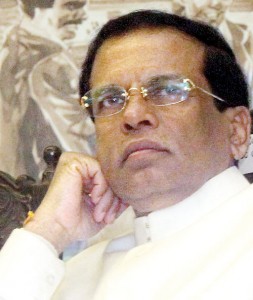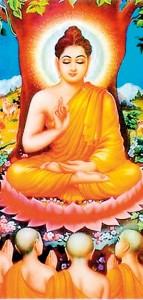Columns
Maithripala’s finest hour
View(s):19th Amendment signals end to ‘Bring back Mahinda’ gravy train
If President Maithripala Sirisena serves the full term of his presidency, and may divine providence enable him to do so, men may still say this was Maithripala’s finest hour.
With the passing of the 19th Amendment to the Constitution by a majority of 212 out of 225 votes on Tuesday night, which dramatically reduced the far flung ambit of presidential powers, Maithripala Sirisena not only kept his promise to the nation, but also reserved to himself a lasting place in world history as being one of the few men ever to have voluntarily renounced the draconian powers destiny had crowned him with. That he did it not merely voluntarily but in the face of stiff resistance served all the more to add splendour to his significant selfless sacrifice.

President Sirisena: Rebel tigers turn to pussycats
As President Maithripala declared after the 19th Amendment was passed, “during the 38 years of the constitution’s existence, all other amendments, apart from the 13th and the 17th Amendments, had been brought only to enhance the powers of the executive presidency even more. Achieving this endeavour in accordance with the Constitution, in line with the Supreme Court determination and with the consent of all political parties in Parliament, is a giant step towards ensuring democracy,”
Contrary to all expectations that he would be able to deliver the goods; faced with an uphill task of persuading his own intransigent party members not to hold back the dawn of a propitious era for Lanka; and dogged by an insidious campaign orchestrated to undermine his presidency by those who had plundered the country and feared exposure, Maithripala Sirisena’s indomitable will, armed only with his shinning sincerity, triumphed in the end. The result was not a mere two-thirds majority, but an overwhelming thumping five-sixth majority. It consolidated his credibility and vindicated the trust the nation had placed on him in no uncertain terms.
Only last week his government seemed to be in shambles. The 19th Amendment appeared to be doomed as the maverick opposition hell bent on scuttling the corruption crackdown used every foul means available to them to frustrate the hopes of a nation to bloom anew with sweeter fragrance.
Yapping first and yapping loudest at Maithripala’s people-led caravan were the Gang of Three, namely Wimal Weerawansa, Dinesh Gunawardena and Vasudeva Nanayakkara, decrepit leaders of dilapidated one-man bands who, for their own future survival as tail wagging appendages of the Rajapaksa regime, yodelled their signature tune ‘Bring back bonnie Mahinda’ on sponsored stages before organised crowds. As the falsetto rose to a crescendo making even 54 members of the SLFP out of the 64 in Parliament to bark at the moon when they signed a petition demanding the shelving of the 19th Amendment, Maithripala Sirisena calmly but chillingly observed ‘crabs only dance until the water gets hot’.
Knowing full well the consequences that would inevitably follow if their godfather was not returned to power to save their skins, they openly rebelled against the President, blatantly flouted party orders, brazenly signed petitions which negated the party’s official position, callously ignored public opinion clamouring for constitutional reform; and, finally, odiously degraded the hallowed House of Parliament itself when, with their desperation rising to fever pitch last week, they dumped the 19A in the dustbin on the day it was to be debated and instead took to holding an all night farce in the well of Parliament demanding the Maithripala government to give an assurance that it would halt the crackdown on corruption against politicians, including Mahinda Rajapaksa and his brother Gotabhaya.
And whilst the high jinks in the parliament well continued far into the night with baila, cards, mimicry and what not, they also uncorked their bottled hopes to avoid judgement day by signing, in the midst of their revelry, a petition which had 116 UPFA MPs demanding the sacking of the Bribery Commissioner.
In the cold sober light of day on the morning after the night before, the bizarre blackmail bid was distinctly clear. Stop the crackdown or no 19A.  For the 19A would restore the disqualification of a twice elected president to contest again and doomed Mahinda Rajapaksa from staging any comeback as president.
For the 19A would restore the disqualification of a twice elected president to contest again and doomed Mahinda Rajapaksa from staging any comeback as president.
More importantly in the immediate circumstances, neither can he be elected as president by his coterie in Parliament in the event of there being a vacancy in the president’s office caused by death or resignation, impeachment or lunacy of the present incumbent, for the 19th Amendment also restores Article 40 of the Constitution which requires that a person so elected by Parliament must also be qualified to be president; and thus this effectively bars twice president Mahinda Rajapaksa from becoming president again through the back door.
He can of course still become prime minister if the circumstances so catapults him to that eunuchised office — if he so wishes and is prepared to lick Maithripala’s slippers as D.M. Jayaratne shamelessly did during his own reign as president.
With the passing of the 19th Amendment on Tuesday night, with even Wimal and gang voting for it, Mahinda Rajapaksa has arrived at a dead end. And thus, with the last nail in his coffined hopes of a return to any meaningful position of power to derail the course of the relentless crackdown on corruption finally driven home by the 19th Amendment, so has the Wimal, Dinesh, Vasu driven gravy train, along with its bobbing carriage of rebel SLFP members, finally hit the buffers.
The pro-Rajapaksa group have discovered to their dismay even as the nation has found to her relief and joy that behind Maithripala Sirisena’s seemingly limp and deceptive handshake there is a wrist of steel that defies the odds and defines the man. They had definitely underestimated this unassuming man of a few words and evidently forgotten that he was the David who brought the giant Rajapaksa Goliath crashing to the ground.
SUNDAY PUNCH 2
The night Siddhartha became Buddha
Over two thousand five hundred years ago in the far off plains of Northern India, a royal prince of the realm renounces his worldly life and embarks upon an unknown path in an unknown quest to find an unknown treasure that would reveal why all life dances on a razor blade, why all life weeps, why all life decays and why all life dies. He knows the answer lies not in ornate halls, in coffers within guarded walls or hidden in the humblest hamlets or submerged in poverty’s sewers.
Sorrow shadows the rich, the poor, the young, the old, the healthy and the sick alike and all beings born are subject to this iron law from which no perceivable end, no way out appears to exist. But he knows there must be, there has to be the path to deliverance; and he determines to find it. And he knows it lies in the way of the abodeless ascetic.
His search for the truth, free from the clangs of domestic chains, free from the trappings of power, free from frivolous mundane pains and free for the soul to flower takes six long, arduous years, which brings him to the brink of death when he realises that extreme penance like extreme pleasure will not enable him to transcend karma’s iron clasp and free mankind from sorrow’s grasp and that the path lay in the middle way.
It is a full moon day in the month of Vaisakha. It is his thirty fifth birthday. Soon the evening gives way to night. He is seated under the sacred tree of wisdom, the Peepal tree under which he had sat all day determined never to rise until he had gained the ultimate. As moonlit beams stream through leaves to shed a warm glow, a breeze blows and brings a drizzle of flowers from surrounding trees. And then a gentle rain softly falls. He notices it and wonders why it is not falling on him. He looks over his head and sees the hood of a giant cobra shielding him from the rain, protecting him from the elements. The lotus is about to blossom and he sits poised in meditation on the threshold of discovery.
The hours pass, but for Siddhartha time stands still. He is absorbed by his surroundings. With every breath he takes he takes in the subtle rustle of the wind, the soothing ripple of the stream, the sweet smell of the earth until nature becomes one with him. He enters the First Watch. From the depths of his consciousness he feels a deep stirring. The demons within him rise. They appear incarnate before his eyes, the living creatures of life’s torments. And then the storm breaks. The assault begins in earnest. From all sides the demons strike but his aura exudes a powerful shield. Then Mara, the God of the Underworld makes his entrance in a chariot drawn by his ghouls. In sonorous voice he warns Siddhartha, “Turn back. None can threaten my kingdom built on man’s insatiable greed.” Mara unleashes his forces. The demons multiply and attack but fail to penetrate the armour of his concentration. Finally Mara retreats. And Siddhartha realises Mara was his own creation; the overlord of his consciousness. He enters the Second watch.
With Mara defeated his consort Maya rises to challenge Siddhartha. Maya of a thousand dances, Maya the great deceiver, Maya, the bewitching seductress. She takes up the gauntlet. This is her forte. She sends in the dancing girls. Mara’s demons now transform into beautiful damsels, their pouting breasts tightly clasped, the full round hips swirl in motion as they advance to break his concentration. He sees them taking shape, becoming more and more beautiful as they near. The music of the past rings in his ears. He feels their hands caressing his body, enticing him with their seductive allures, but they fail to move him. His mind remains unshaken. He defeats Maya and her girls.
He now enters the state of Samadhi. He enters into another dimension. The dimension of space. Time and space converge; the past, present and future merge into a single entity. And he sees his past births flashing before his eyes. He enters the second state and sees how all life repeats the cycle of rebirth. Born only to perish and in death to be reborn again.
He enters the third state. And he dwells on the obstacles that prevent man from realising the way out of this cycle of woe. The five hindrances namely lust, anger, languor, restlessness and doubt that springs from a lack of understanding of the nature of the world. And he dwells on seven factors to realise clear vision: mindfulness, true inquiry, energy, relaxation, concentration, equanimity and joy to transcend the melancholy and gloom of the mind.
Then with joy he enters the fourth state: Higher consciousness. He begins to meditate on the law of cause and effect and realises that whatever being or thing, if it has within the nature of arising, it also has within its own seed, the nature of its own cessation. The answer lay not in an external power, but within the core of oneself.
Absorbed thus in the nature of things he body starts to emit colours. Blue from his mind, yellow from his flesh, red from his blood and orange from his nerves and bones. There he sits under the Bodhi, rapt in meditation, in serene calmness, radiating from within a whole spectrum of colours with a giant cobra standing guard. Mara he had defeated. Maya he had vanquished but enlightenment still eludes him. One more barrier remains, the greatest obstacle of all had to be overcome. And then there dawns perception. The final chain he has to shed is his own ignorance, his own ego. It is ignorance that lay at the core of all suffering. Ignorance, the root of all ills.
As dawn breaks and the first streaks of light sweep across the land and a rosy hue touches the sky; as the Heavens resound with delight, as the Gods bow in reverence and as the Earth itself blossoms with enchanting hope, Siddhartha attains the supreme sublime state of tranquillity; the quintessence of bliss. And, in the steps of twenty seven others before him, becomes a Buddha.
SUNDAY PUNCH 3
Jackie F to shake her body bootyful for Rs. 84mn
Lanka’s hopper queen Jacqueline Fernandez who made good with Bollywood’s upper crust has demanded Rs 84 million to dance her body bootyful at an Indian businessman’s son’s wedding to be held in London end of May.

Jacqueline: Cash dance
And the high spending tycoon has agreed to splash out the dough for some belly swirling, hip wriggling and leg shaking from sexy Jackie to give his son an extra sizzle of Lanka’s Kaema Sutra served spicy hot as an appetiser before setting out on his honeymoon.
Oh lucky man to have a doting dad to give him a night to remember as he bids goodbye to his bachelor days with a final fling of fun, minutes before he ties the nuptials and bites the dust.
But the old man’s not merely depending on Jackie alone for his son’s viewing pleasure. Possibly to give more instinctual psychic energy, he has already lined up a few actresses also to perform on the occasion. Jackie’s travel to London and her room for two nights will also be paid for by the rich business family, India’s NDTV reported on Thursday. No mention has been made, however, whether the no expense spared lavish wedding will have on the banquet menu the Rs. 250 each hoppers Jackie’s restaurant Kaema Sutra serves to the filthy rich in Colombo’s Arcade. Maybe not. Perhaps there’s a limit to even a spendthrift’s squander. Even billionaires’ coffers are not depthless. Maybe it was a tossup between Jackie’s dance and Jackie’s hopper. Perhaps Jackie came cheaper.
And now for the 84 million buck question to the lucky groom: If you say she has a beautiful body will she hold it against you?
SUNDAY PUNCH 4
Bodu Bala halo blown with the wind
Eight men in robes appeared in the dock at the Fort’s Magistrate’s Court in Slave Island last Friday, in respect of two cases filed against them. One was for trespassing upon private property by storming into a private hotel and breaking up a media conference attended by both Muslim and Buddhist clergy. The other was for insulting the Holy Quran in public outside the Slave Island police station. The cases were fixed for June 16 with the police ordered by the Magistrate Priyantha Liyanage to file the relevant charge sheets.
These men in robes were not imposters. In fact, if there was one thing genuine about them it was that they were ordained monks of the Noble Order of Bhikkus. They were also card carrying members of the bigotry ridden brigand, the self proclaimed guardians of Buddhism, the once untouchable Muslim-bashing Bodhu Bala Sena, now fallen on harsh times with their halo of immunity blown with the winds of change. And, in the dock, making his debut appearance, was its leader, the organisation’s General Secretary , Galagoda-atte Gnanasara Thera, now left bereft of his earthly divinities, now denied the aura of protection his ishta devas had once cast around his beefy bulk.
So what propelled these saffron robed ordained followers of the Buddhist way to veer away from the path the Buddha trod; and instead tramp the mean, murky street of raw racism which has finally led them to the dock of a Slave Island criminal court?
Ever since they mysteriously emerged from their shadowy kutis and held their first convention at the BMICH in July 2012, they preached not the Buddha’s message of loving kindness but the vicious gospel of racial hate. From the first virulent flow of vituperative slime that cascaded from the steps of the BMICH to seep into the nation’s collective thought stream, their venomous flood continued unabated until now; and, though it threatened to rip the fragile fabric of religious harmony, no serious effort was taken by the Rajapaksa Regime to dam its ebullient tide.
Bolstered by the seal of tacit government approval, it was a matter of time when their spouted hate spilled blood on the street. Last year in June, swarming into the predominantly Muslim town of Aluthgama, already charged with racial tension over a local incident, the racial spittle they spat served to crackle racial fires; and the rabid rhetoric of Gnanasara was an inciting call to arms for a charged Sinhala mob to ravage the Muslim town.
That night at the Aluthgama meeting held on June 9, the Bodu Bala chief Gnanasara declared, raising his hand defiantly, “spineless ministers and others say we are racists, they say we are religious bigots. Yes, we are racists. Yes, we are religious bigots. We tell everyone, this country still has a Sinhala police. Still has a Sinhala army. After today, if one Sinhalese is even touched, let alone a robe, if one Sinhalese is even touched by any Muslim or anyone else that will be the end of them all.” Mob violence burst shortly after and the rampaging mob murdered three Muslims on the Dharga town streets in Aluthgama.
The dark days of Bodu Bala bigotry when they rode roughshod over minorities with impunity and blackened the saffron robe with their racist message of hate are now at an end. The welcome winds of change have swept them off their pedestal as the self appointed guardians of Buddhism armed with immunity to let their evil fall where it will. The orgy of racist terror is over. The die is cast.


Leave a Reply
Post Comment